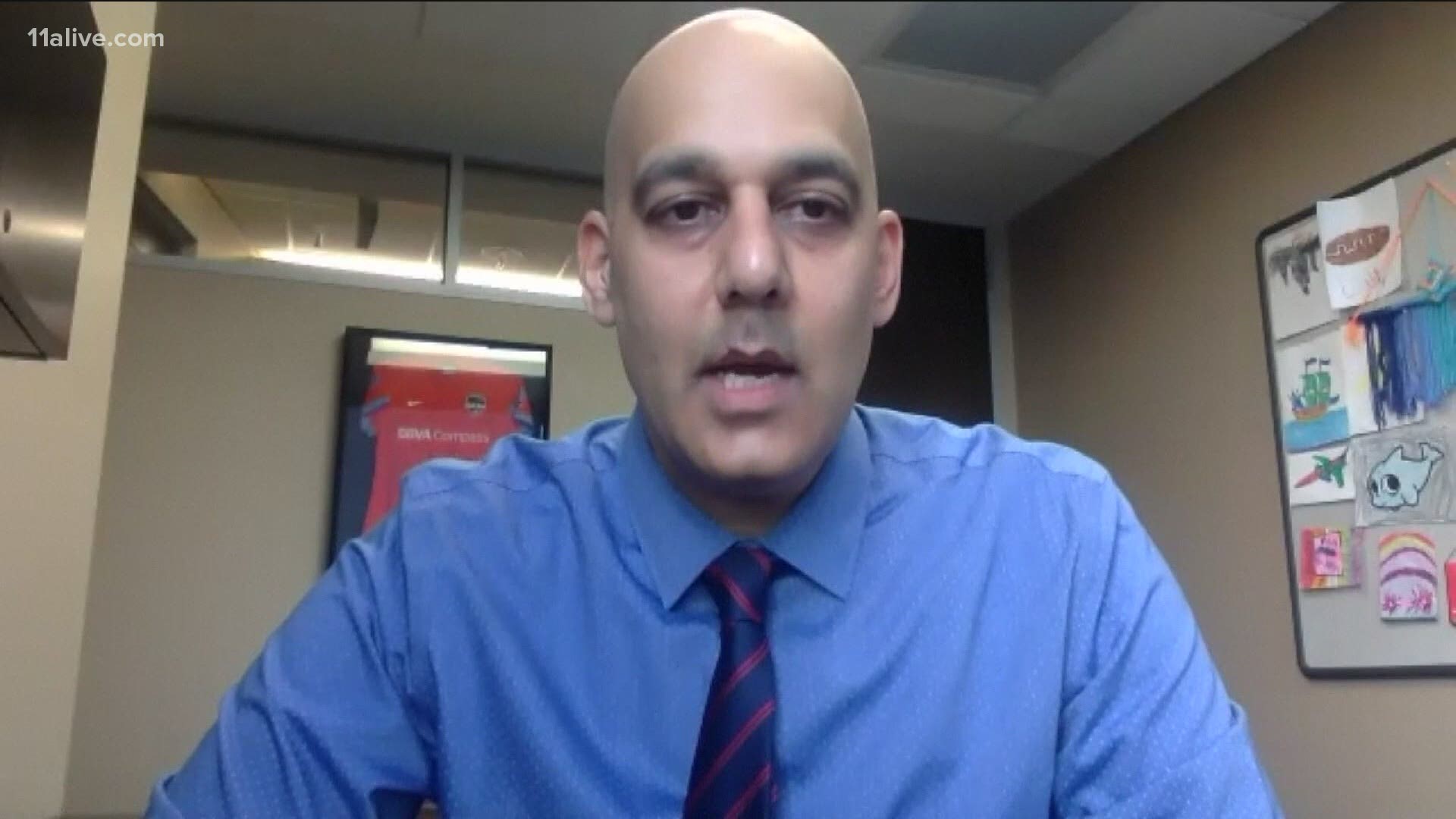ATLANTA — A growing concern among the officials who have to decide whether athletes should be returning to their sports as the coronavirus pandemic continues is a heart condition that's been observed in some COVID-19 patients.
Myocarditis is, as Dr. Jonathan Kim of Emory Healthcare outlined Thursday, most simply described as an "inflammation of heart muscle, and it's typically brought on by viral infection."
The issue is coming to the fore most notably with college football, as the Big Ten and Pac-12 both postponed their fall seasons this week. In the Big Ten's case, ESPN reports the decision was directly linked to at least five athletes in the conference being found to have myocarditis.
Dr. Kim is a leading sports cardiologist who established the Emory network's first sports cardiology practice, and helped formulate guidelines back in May on athletes returning to play.
Those guidelines were formulated after early research out of China showed heart complications in as many as 20% of COVID cases. Dr. Kim said Thursday that when they issued the guidelines, they aimed to make them conservative because there was still much unknown about the connection between COVID-19 and heart issues.
That data is still lacking in many respects - with further research in late July finding a high rate (60%) of myocardial (heart muscle) inflammation in a set of 100 German patients recovering from COVID-19.
As we learn more, Dr. Kim said, and particularly as high-profile cases like that of Boston Red Sox pitcher Eduardo Rodriguez with myocarditis have emerged, it "affirms we need to take this virus very seriously and proceed with a more conservative" view of risk.
He said the inflammation can present itself in different ways, from being hardly noticeable at all to being incredibly severe. More commonly, it's not very severe in the general population.
But the physical exertion athletes regularly undergo "can actually make the inflammation worse."
"And when you have that inflammatory process within the heart muscle, if you are engaging in high-end physical activity, that could potentially precipitate dangerous heart rhythms which could lead to a cardiac arrest or catastrophic outcome," Dr. Kim said.
"We know myocarditis is a more common cause of sudden cardiac arrest or sudden cardiac death in athletes," he added. "It's certainly something we take very seriously in athletic patients."
Typically, sports cardiologists recommend three months of rest minimum, with no high-end physical training, in instances of athletes with myocarditis, and potentially up to six months.
Then they would give them a number of tests. In the recommendations formulated earlier this summer, Dr. Kim and his colleagues suggested for a typical athlete with no obvious symptoms returning from COVID, they should get a 12-lead electrocardiogram, echocardiogram ultrasound of the heart, and a test looking for troponin, a protein he said is released into the bloodstream when there's a cardiac injury.
"Any abnormalities in the three of those ... would raise suspicion for potential subclinical injury in an athlete that would warrant additional testing," he said. "But if all tests are normal then it's reasonable to allow the athlete back to training."
He added that the concern doesn't necessarily just exist for organized athletes. He said he's been approached by marathon runners, triathletes and other competitors or recreationalists of sports that require high exertion, and said they should probably consult their doctor and possibly also see a sports cardiologist before returning to their activity.
Dr. Kim declined to make a direct recommendation of whether high schools and colleges should be allowing athletes to return to football - probably the most pressing issue related to myocarditis at the moment - calling it more of a public health question for experts like Dr. Anthony Fauci, one better based off local conditions and the current spread of COVID.
"So of course I'm a sports cardiologist, I take very seriously the concerns of potential cardiac injury from COVID-19 infection. It's important to note we've known about this really since we started to learn about the virus in the springtime, so the question of injury to the heart in athletes coming back has clearly been on our minds," he said. "But it still goes back to public health question."
How further data emerge, he stressed, will be one of the most important factors in how the myocarditis issue steers leagues and conferences as they tackle how to address COVID-19.
11Alive is focusing our news coverage on the facts and not the fear around the virus. We want to keep you informed about the latest developments while ensuring that we deliver confirmed, factual information.
We will track the most important coronavirus elements relating to Georgia on this page. Refresh often for new information.
MORE HEADLINES

